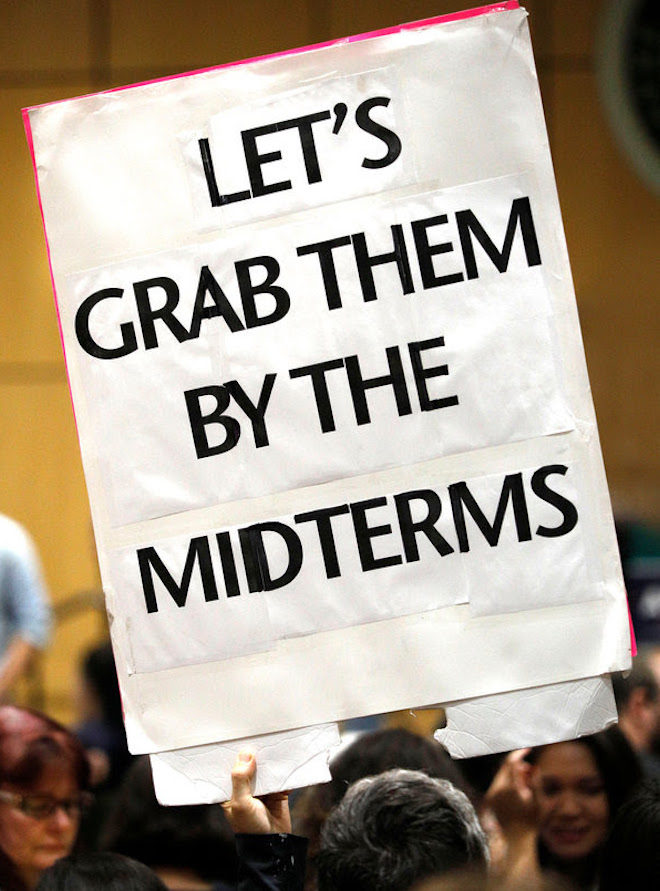An illegitimate SCOTUS
ROGER FITCH ESQ • THURSDAY, OCTOBER 11, 2018
The US Supreme Court has been bought ... Long campaign to stack the court with judges favourable to corporate interests ... Huge lobbying and spending to secure Kavanaugh's confirmation ... Guns, God and presidential power ... The mid-terms and intensified voter purging ... From Our Man in Washington, Roger Fitch
"With Anthony Kennedy's retirement, there is no discriminatory voting restriction the justices will be unable to sanction, no immigration law born in animus they will be unable to approve, no expansion of corporate power they will be unable to accept, no grant of presidential immunity they will be unable to uphold, no financial or environmental regulation they will be unable to strike down, no religious objection to an antidiscrimination law they will be unable to recognize, no worker protection they will be unable to repeal, no limitation on abortion they will be unable to allow, and no abuse of power by law enforcement they will feel compelled to restrict" - The Atlantic.

The inevitable has happened. The US senate, unmoved by sexual assault allegations, the nominee's surly demeanour, and an open letter of opposition signed by over 2400 law professors, conferred a lifetime supreme court appointment on DC Circuit Judge Brett Kavanaugh.
A "movement conservative", Judge Kavanaugh is a Republican stalwart and former player in distasteful and highly partisan political operations. The party clearly believes he can be relied upon to bat away legal precedents standing in the way of party policy or the Republicans' hold on office (e.g, the coming troubles of Mr Trump), and his first case may offer him a chance to, uh, make a difference.
At the supplementary senate hearings held following new accusations of youthful sexual assaults, Kavanaugh showed a palpable sense of self-entitlement, revealing an injudicious temperament, yet another cause for concern, including to the American Bar Association, who wanted to reopen its review of his qualifications.
A snarling Kavanaugh lashed out at "the Clintons" and "left-wingers", ominously adding, "what's goes around, comes around". As it turns out, Kavanaugh's bad-boy drinking, woman troubles, and (perhaps calculated) senate counterattack have all been red meat for Trump's white male base in the lead-up to the November 6 elections.
Earlier hearings followed extensive legal blogging on Kavanaugh's judicial record and the likely consequences of his appointment; the senate focussed on his legal philosophy and attachment to precedent.
Conservative donors outspent liberals to influence the confirmation vote; corporate front groups keen to seat Kavanaugh spent $15 million. This was unsurprising; the nominee's double standard for corporations has already been the subject of a report by Public Citizen - more here.
By a happy coincidence, Judge Kavanaugh has a very broad view of campaign contributions, including those employed to place judges like him on state and federal courts.
The supreme court was already lurching right, particularly after Trump's addition of the radical Neil Gorsuch, and Justice Kennedy's occasional departures from Republican party script usually involved social issues such as criminal justice or gay rights. Even if Kavanaugh had not succeeded, an equally odious justice would have been confirmed by the immoderate Republican senate.
Although there is some suggestion that CJ John Roberts will provide a "swing vote", it seems more likely that an extreme far-right faction (comprising the CJ, Clarence Thomas, Joseph Alito, Gorsuch and Kavanaugh) will be in control for the first time since the early days of Franklin Roosevelt. All five of them lack legitimacy, in the view of the eminent law dean Erwin Chemerinsky.
The Atlantic's Adam Serwer fears a return to the days of the 19th century "Redemption" supreme court; others worry that the court could be headed for the lawless laissez faire of the Lochner era, a business paradise where most social and economic regulation was constitutionally circumscribed.
Some Democrats have threatened to impeach Justice Kavanaugh, and certainly a newly Democrat house of reps could investigate his misstatements to congress (and a lot more: Republicans are circulating a spreadsheet of potential unwelcome investigations if the Democrats "flip" the house in November).
In the long run, there remains the option of "court-packing": FDR's proposed Judicial Procedures Reform Act of 1937, though never adopted, precipitated a salutary left turn on the court, enabling him to have his legislation upheld.
It's a big choice, but there's nothing to prevent the number of justices being increased under a Democrat administration; nine justices are really too few for the proper supervision of a vast judicial system with thirteen circuit courts of appeal.
Law prof Michael Dorf thinks that two additional judges would be about right, and the best revenge for the Republicans' 2016 theft of Antonin Scalia's seat; there may also be a need for new court of appeals positions, to offset the Republicans' ongoing judicial sabotage in the lower courts.
The supreme court's new term has meanwhile begun. Marjorie Cohn looks at the pending big cases that explain the Republicans' rush to get Brett Kavanaugh on the court. On his first day on the bench, Justice Kavanaugh heard oral arguments in two of the cases making this term a "criminal law professor's dream".
READ THE REST HERE....
READ THE REST HERE....



